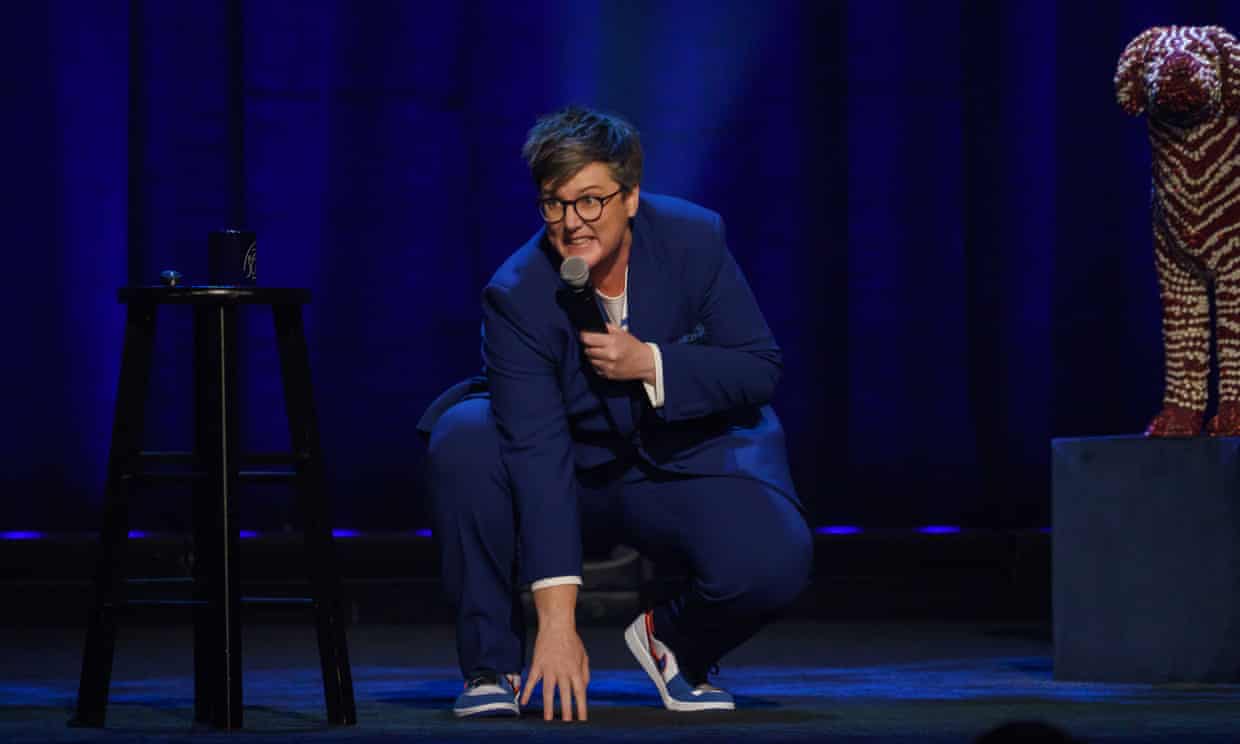
Lockdown culture
Hannah Gadsby: Douglas review – crusading comedy with great gags
Available on Netflix
Gadsby follows up her hit show Nanette with a swaggering set that blazes with well-earned confidence
by Brian LoganThe last time Hannah Gadsby released a Netflix special, it changed her life – and arguably, changed comedy. In Nanette, she publicly quit standup, the practice of which – she argued – made her complicit in her own (homophobic, mainly) oppression. It was a fierce provocation, delivered with expert control of increasingly serious tone, and it introduced a new lens through which to consider self-mocking comedy. Far from ending Gadsby’s career, it gave that career a spectacular new lease of life.
Douglas begins that new life. As I wrote on seeing it live last autumn, it’s a more approachable set than its predecessor. Gadsby is obviously having fun – which isn’t something you could say about Nanette – but it’s in no way a climbdown. The show (her 1oth – but also her “difficult second album”, she admits) is perfectly judged, a 75-minute set that proves self-deprecation is a thing of the past for Gadsby, that blazes with well-earned confidence, and that hitches her crusading, patriarchy-bashing humour to great jokes, meticulous set-building – and a new cause.
Part of its appeal is Gadsby’s newfound swagger – real, but sometimes teasingly sent up. That’s never more in evidence than in her remarkable prelude, in which our host itemises routine by routine what she’ll be saying and doing in the show to follow. It’s a real coup, which lays depth charges that will detonate for her throughout the set, and tees up the subject towards which the show tends: Gadsby’s 2015 diagnosis of autism.
I did find that opening set piece more thrilling live than on Netflix, because it was a surprise first time round. Also, being in the room with her made it feel more like a dialogue, tight-roping between smug and playful, than a look-at-me trick. But whether the sequence delights or disconcerts us is all equal to Gadsby: after all, autistic people, she tells us, seldom make a good first impression.
There’s great craft in the show that follows, as Gadsby builds from a hack starter on the differences between US and Australian speech, via a dog-walking anecdote (which prises open her anti-sexist theme), towards a takedown of male arrogance in having named, diagnosed and depicted everything, forever, on their own partial terms. The show’s title derives from an intimate body part named after an 18th-century Scottish doctor. Its closing art history lecture – one great visual gag after another – marvels at what the so-called Old Masters chose to depict. And Gadsby’s material on neurodiversity smoulders with fury at the doctors who dismissed her as “hormonal” and the perception of autism as the preserve of nerdy boys.
It’s a well-constructed set, with a high hit-rate of jokes. Even the weaker, cruder sections – those laying into golfers and anti-vaxxers – are redeemed by neat one-liners, like Gadsby’s claim to be “microdosing” herself on social media abuse from the latter: “Your hate is my vaccine.” Finally, the show emerges as a trenchant defence of Gadsby’s right to be different – and to make shows that won’t fit (as per Nanette) within narrow definitions of comedy. “My brain takes me to places no one else lives,” she claims – but if the success of Douglas is anything to go by, more and more audiences will choose to spend time there.